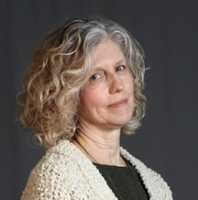IU School of Education
Internationalized Courses:
Examining Self as Teacher (EDUC F200)
American Culture and Education (EDUC H341)
Curriculum Internationalization Effort
For many semesters, my Examining Self as Teacher and American Culture & Education classes have video-conferenced with Universidad Autónoma del Estado de Hidalgo (UAEH) in Pachuca, Mexico. In both of my courses, students here at IU Indianapolis converse with students majoring in Education at UAEH about the education systems in Mexico and the U.S.
““Curriculum internationalization helps promote intercultural understanding that is such a necessary component in the quest for local, national, and global problem-solving.”Dr. Deborah Biss Keller
On the days that we videoconference, I instruct my students to each be prepared with two questions for their UAEH counterparts. Our discussions usually follow the same format: a student from UAEH will ask a question about the U.S. education system, we address it, then one of my students asks a question about the education system in Mexico, and they address it, and so on. During these exchanges, there is usually a translator present at UAEH. Students there typically speak in Spanish, though sometimes they speak in English. Students in my courses respond and ask questions in English, although I encourage those who are native Spanish speakers to speak in Spanish if they wish. This virtual dialogue provides all of the students an opportunity to gain better intercultural understanding as conversations often move to cultural, political, and economic dimensions – all of which are related to education.
“"The international videoconference, organized by the School of Education, is an important cross cultural experience for our students. They have the opportunity of discussing with students from IU Indianapolis about the reality of the educational systems, such as the influence of the cultural backgrounds and the perceptions they have as students; specially when they are willing to be teachers. We definitely celebrate that the use of technologies is helpful when we try to exchange these kind of ideas that contributes to their critical thinking and their academic development"Berenice Alfaro Ponce, Research Professor, UAEH
The intercultural component of this course allowed IU Indianapolis students to see their own culture in perspective and to appreciate the variety of the human experience. The reviews emphasized the need for the students to be open-minded, to reconsider previously-held beliefs and to adjust their thinking based on newly-received information. The students also understood the necessity of being able to operate with respect and dignity in a complex world, and to recognize the connectedness of local and global communities.
Benefit to students
The experience of videoconferencing with UAEH is particularly important for my students to have myths and stereotypes surrounding Latinx immigrants debunked, and for my students to recognize Latinx students’ funds of knowledge. As prospective teachers, it is crucial for my students to be culturally competent and to examine their assumptions and beliefs about others. The experience also provides the students in Mexico the opportunity to hear that we value their culture.
As a follow-up, students engage in class discussion and/or reflective writing assignments. Students’ reflections have emphasized the importance of gaining access to different perspectives on teacher education and education systems; communicating via translators; appreciating other people’s groups and cultures; and more. The aim is for my students to develop self-awareness that facilitates an openness to grapple with many types of systemic oppression and their roles in working toward a more egalitarian society.
Student Reflections
"I never had the opportunity of assisting to a video call with foreign students. So this was a unique, pleasant and interesting experience for me. I had the opportunity to ask some questions such as, the way of assessment in their school and about the process of admission to enter the university. I was able to gather a lot useful and novel information that I did not know very well about their educational system and extra things. I hope to repeat this experience again"
- Zaira Cortéz, UAEH Student
“I loved being part of the teleconference. I think it opened our minds about our positionality in the world as students in the USA. I found it very interesting and appreciated the fact that we could get a real-world answer for the questions we had and broadened our horizons with culture, education, and language. I would do it again if given the chance!”
- Halsey Foltz, Former Student in Examining Self as Teacher (F200) Course, IU Indianapolis
“Videoconferencing with students from Mexico gave me an opportunity to make a global connection. Through this experience, not only did I gain insight into how higher education operates in Mexico, but I also realized the value of technology in education. Building relationships with other students and educators from a different country gave me more depth as a student and more confidence when working with individuals from different ethnic backgrounds.”
- Jennifer Hashem, Former Student in American Culture & Education (H341) Course, IU Indianapolis
"It was a wonderful experience. Getting to know about how the educational system works in another country was very interesting. However, the thing, which I most enjoyed, was having the opportunity to share our own experiences and thoughts with other students who are studying education as well. I learnt how different the scholar life is and the pros and cons we have at our own schools."
- Diana Ramírez, UAEH Student
Benefit to faculty
The cross-cultural dialogue helps me in teaching intercultural understanding. I have presented about the experience at the national level at the Critical Questions in Education Conference, hosted by the Academy for Educational Studies, and with students at the Edward C. Moore Symposium on Excellence in Teaching.

